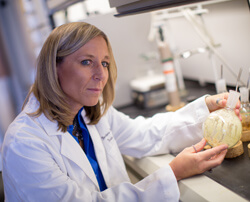
Doorways to Discovery
November 11, 2014

Enter the Johns Hopkins Brain Science Institute’s (BSi’s) NeuroTranslational Drug Discovery Program, led by Barbara Slusher. “The BSi’s mission is to translate basic science discoveries into drugs that improve patient care,” says Slusher, who joined Johns Hopkins in 2009 after 18 years of leading research and translational development in the drug industry.
In what she describes as “a changing ecosystem” in drug discovery, Slusher is building key partnerships with basic scientists at Johns Hopkins and the drug industry to find new drug treatments for neurological disorders—and speed their paths to market. In 2011, the BSi entered into a special collaborative, high throughput screening agreement with Tokyo-based pharmaceutical giant Eisai Co. Ltd. “With this, we put the program’s mission on an accelerated course,” says Slusher. Eisai is sharing its entire proprietary drug library with the BSi for teasing out new treatments based on novel Johns Hopkins targets.
Slusher and her team are currently pursuing six drug discovery programs with Johns Hopkins faculty in a number of therapeutic areas, including schizophrenia, peripheral neuropathy, pain, neurodegeneration, multiple sclerosis and brain cancer. They have raised funds, signed licensing agreements with drug companies and spun out a new company, Cerecor Inc. They are demonstrating that innovation, depth of knowledge, research capabilities and understanding patient needs combine to make a highly productive environment for drug discovery.
Slusher is also working outside of Johns Hopkins to bring together this growing community around academic drug discovery. “Partnerships are the future of drug discovery in every field,” she says. With colleagues from the University of North Carolina, Harvard, Vanderbilt and the University of California, San Francisco, she founded the Academic Drug Discovery Consortium (aD2c) to exchange know-how and create repositories of shared data and information. In less than two years, 110 academic centers and more than 1,000 individuals from around the world have become aD2c members.
Challenge: To translate Johns Hopkins discoveries into new drug treatments for neurological disorders.
Approach: Slusher and team are building drug discovery capabilities internal to Johns Hopkins; they also are educating and collaborating with faculty interested in drug discovery and translation.
Progress: Six Johns Hopkins drug discovery projects have been initiated, partnering agreements have been formed with pharmaceutical companies for three projects, a new drug discovery company was founded, new graduate courses in drug discovery courses have been initiated, and an international academic drug discovery consortium was founded and is flourishing.

